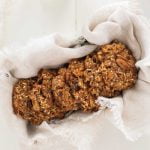This likely doesn’t come as a shock, but we are collectively not getting enough fiber into our diets. Take it from nutritionist and physiotherapist Simon Hill: “Most of us are only getting 15 to 20 grams of fiber a day,” he says on the mindbodygreen podcast. “And the research shows we would do significantly better if we were getting 30-plus grams per day.”
It’s certainly a case for more fiber-rich foods on your plate, such as legumes, grains, and nuts and seeds. But, unfortunately, loading up on fiber can come with some unfavorable symptoms for a significant chunk of people, at least in the beginning: “I quite often hear, ‘I feel abdominal pain or bloating,'” Hill reveals. And—surprise, surprise—he says it may have everything to do with your gut microbiome.
How your microbiome can affect your response to fiber.
Hill references a recent Stanford study that compared a diet that increased fiber versus a diet that added fermented foods. During this 10-week study, “they had one group increase their fiber intake from 20 to 40 grams per day,” says Hill. “The other group added six servings of fermented foods to their diet per day.” You know, kimchi, sauerkraut, and the like.
The researchers then measured a host of markers to discover how these two diets affected inflammation (which can lead to bloating and discomfort as a result). “They found a few unusual things in the study,” notes Hill. “The fermented food group, across the board, saw increased diversity in their microbiome, and they had a dramatic reduction in inflammatory markers.”
In the high-fiber group, however, the results weren’t as conclusive: Some people saw a decrease in those inflammatory markers, but others saw a stark increase. Why? Well, it all depended on the health of their gut microbiome.
“Individuals who had really low diversity—so a really weak gut—struggled with the increase in fiber, and it actually increased inflammation,” says Hill. “Whereas those who had a very diverse, well-equipped microbiome ecosystem did quite well, and actually saw a decrease in inflammation.”
Getting fiber into your diet is crucial, especially when the average American is only eating about half of what’s recommended. However, says Hill, you might need a bit of prep work, depending on the state of your microbiome. “Depending on where someone’s starting, it might not always be a good idea to just jack up your fiber intake,” he says.
So when he hears people complain of abdominal discomfort or bloating from increased fiber, he typically recommends they try to increase microbial diversity in their gut first. “If you’re finding that you’re increasing fiber and you’re not feeling great, my recommendation from today’s evidence is to back off a bit, go slower, and build it up over a period [of time],” he says.
During that period, perhaps you focus on fermented foods before you start ramping up the fiber. As Hill says, “Go get your sauerkraut.” (Or at least a few of these fermented superstars.)
Consuming a healthy amount of fiber is essential, but according to Hill, you might not want to overdo it without tending to your gut microbiome. Of course, you could be dealing with certain food intolerances or sensitivities that could lead to that discomfort—it’s important to rule those out before chalking it all up to gut health. But if it’s the fiber that makes you feel bloated, getting your fill of fermented foods may be a good idea.







